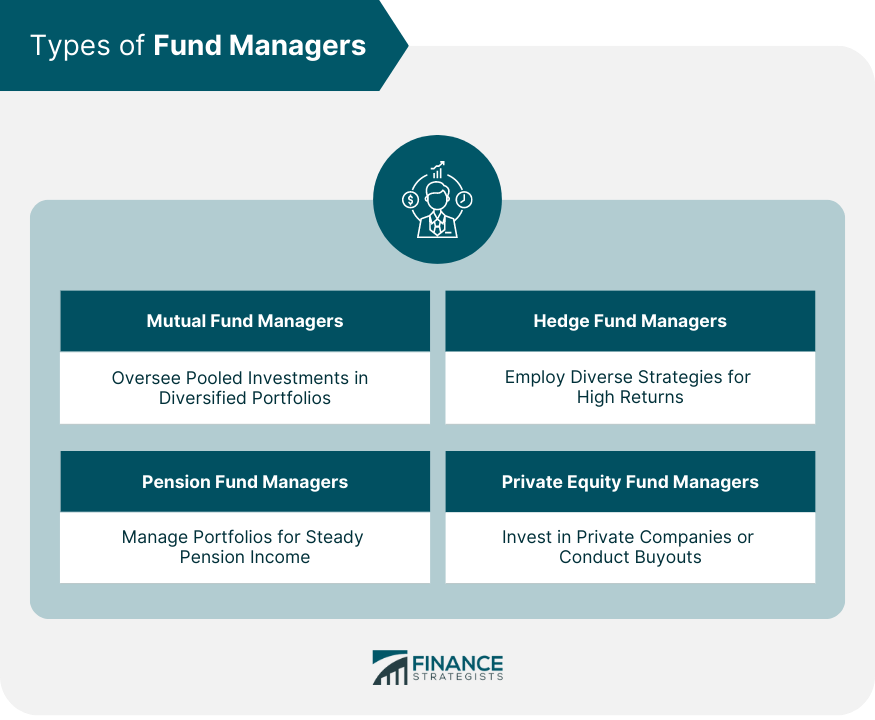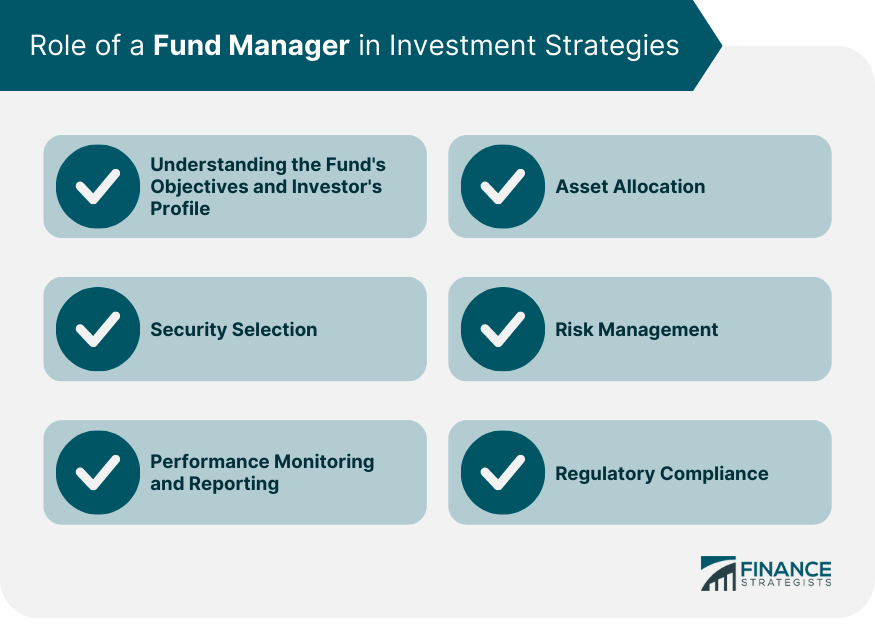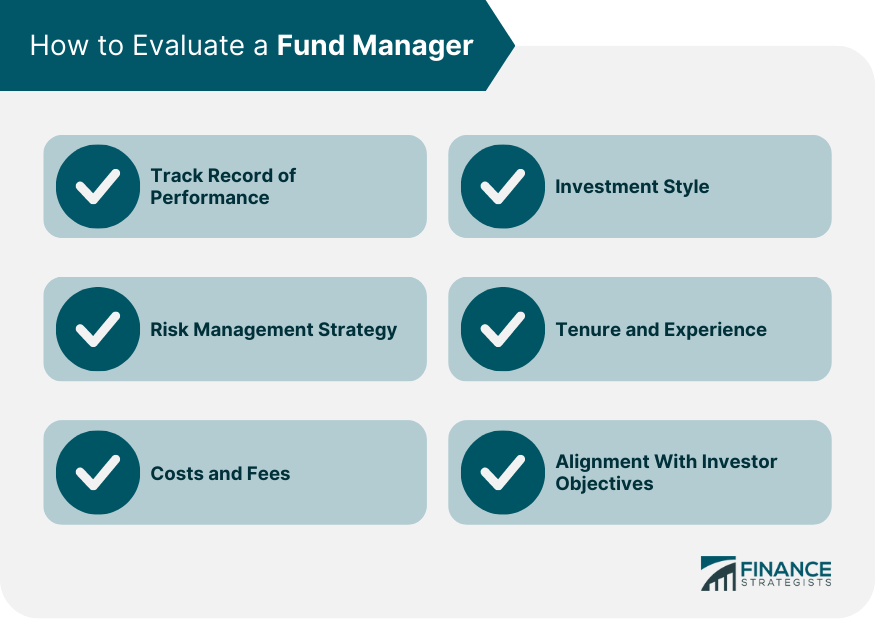A fund manager is a professional who oversees and makes decisions about the investments in a portfolio or fund. This individual is responsible for implementing a fund's investment strategy and managing its trading activities. Fund managers have a range of responsibilities, from researching investments and deciding which assets to buy and sell to monitoring the portfolio's performance and reporting to clients or stakeholders. There are several types of fund managers, including mutual fund managers, hedge fund managers, and pension fund managers, each with their own unique responsibilities and areas of expertise. Most fund managers have a background in business, finance, economics, or a related field. They often hold advanced degrees such as a Master's in Business Administration (MBA) or are Chartered Financial Analyst (CFA) certified. Fund managers need to possess various skills, including analytical, decision-making, and interpersonal skills. Professional certifications, such as the Chartered Financial Analyst (CFA) certification, are often required or preferred for fund management roles. Mutual fund managers oversee a fund that pools money from multiple investors to invest in a diversified portfolio of stocks, bonds, or other assets. Hedge fund managers oversee funds that use a variety of investment strategies to generate high returns. These strategies can include leverage, short selling, and derivatives trading. Pension fund managers oversee the investment portfolios of pension funds, with the goal of generating a reliable and steady income stream for pensioners. Private equity fund managers oversee funds that invest directly in private companies or conduct buyouts of public companies, resulting in the delisting of public equity. The objectives may be focused on growth, income, preservation of capital, or a combination of these. The investor profile, on the other hand, includes aspects like risk tolerance, investment horizon, and financial goals. A good understanding of these aspects helps the fund manager create an investment strategy that aligns with the investor's needs and expectations. Asset allocation is the process of dividing a portfolio's investments among different asset categories, such as stocks, bonds, and cash or equivalents. It balances risk and reward based on an investor's goals, risk tolerance, and investment timeline. Fund managers use their expertise and analytical tools to select the right mix of assets that has the potential to achieve the desired returns while minimizing risk. This process involves analyzing financial statements, economic indicators, and market trends. The goal is to identify securities that are undervalued and have good prospects for returns, while aligning with the risk-return profile of the portfolio. It involves identifying, assessing, and taking steps to mitigate or control the various types of risks that could affect the fund's performance. This includes market risk, credit risk, liquidity risk, and operational risk, among others. Techniques used in risk management might include diversification, hedging, and using derivatives. Fund managers continually monitor the performance of the portfolio against the fund's stated investment objectives and benchmark indices. If the portfolio is underperforming, the manager needs to identify the reasons and make necessary adjustments. They also regularly report to the investors about the portfolio's performance, market trends, and any changes in strategy. Fund managers must also ensure that all investment activities comply with relevant laws and regulations. This can involve keeping up-to-date with changes in financial regulations, maintaining accurate records, and making necessary disclosures. A fund manager's past performance, while not a guarantee of future results, provides valuable insights into their skills and competence. Look at the performance of the funds they have managed over different time frames and compare it to relevant benchmarks and peer funds. This comparison will give you an idea of how the fund manager performs relative to the market and their competitors. Some managers might follow a growth-oriented style, focusing on companies that are expected to grow faster than the market. Others might be value-oriented, looking for companies that are undervalued by the market. Similarly, some managers prefer a passive investment strategy, aiming to replicate the performance of a specific index, while others follow an active strategy, seeking to outperform the market. Make sure their style and strategy align with your investment objectives and risk tolerance. A good fund manager should have a comprehensive approach to risk management, ensuring the fund's risk level aligns with its investment objectives. Techniques used might include diversification across sectors and regions, using derivatives to hedge against certain risks, or keeping a portion of the portfolio in liquid assets to meet unexpected redemptions. A manager with long tenure at a fund provides continuity and stability, which can be beneficial for the fund's performance. In addition, a manager with significant experience in different market conditions and economic cycles is likely to have a better understanding of how to navigate through varying market scenarios. High costs can erode returns over time. Check the expense ratio of the funds managed by the fund manager, which includes management fees and other operational costs. A lower expense ratio is generally better, but it should also be weighed against the potential for higher returns. Check how well the fund manager's approach aligns with the investment objectives of the investors in the fund. The fund manager's investment strategy should match the risk tolerance, investment horizon, and financial goals of the investors. A fund manager plays a crucial role in overseeing and making investment decisions for portfolios or funds. Their responsibilities include researching investments, managing trading activities, and reporting to clients. Fund managers require educational qualifications in finance or related fields, along with essential skills such as analysis and decision-making. They can specialize in different types of funds, including mutual funds, hedge funds, pension funds, and private equity funds. Fund managers are responsible for various aspects of investment strategy, including understanding fund objectives and investor profiles, asset allocation, security selection, risk management, performance monitoring, and regulatory compliance. Evaluating a fund manager involves considering their track record of performance, investment style and strategy, risk management approach, tenure and experience, costs and fees, and alignment with investor objectives. Selecting a competent and compatible fund manager is crucial for achieving investment goals and maximizing returns while managing risks. Investors should carefully evaluate these factors to make informed decisions about the fund manager that best suits their investment needs and preferences.What Is a Fund Manager?
Educational Background and Skills Required
Educational Qualifications
Essential Skills
Professional Certifications
Types of Fund Managers
Mutual Fund Managers
Hedge Fund Managers
Pension Fund Managers
Private Equity Fund Managers

Role of a Fund Manager in Investment Strategies
Understanding the Fund's Objectives and Investor's Profile
Asset Allocation
Security Selection
Risk Management
Performance Monitoring and Reporting
Regulatory Compliance

How to Evaluate a Fund Manager
Track Record of Performance
Investment Style
Risk Management Strategy
Tenure and Experience
Costs and Fees
Alignment With Investor Objectives

Conclusion
Fund Manager FAQs
A fund manager oversees and makes investment decisions for portfolios or funds. They are responsible for implementing the fund's investment strategy, managing trading activities, and reporting to clients or stakeholders.
Fund managers typically have educational backgrounds in business, finance, economics, or related fields. Advanced degrees such as an MBA or professional certifications like the Chartered Financial Analyst (CFA) are often preferred. Essential skills for a fund manager include analytical abilities, decision-making skills, and interpersonal skills.
Fund managers can handle various types of funds, including mutual funds, hedge funds, pension funds, and private equity funds. Each type has its own unique characteristics and investment strategies.
Fund managers construct investment strategies by understanding the fund's objectives and investor profiles, allocating assets among different categories, selecting specific securities, managing risks, monitoring performance, and ensuring regulatory compliance.
Evaluating a fund manager involves considering factors such as their track record of performance, investment style and strategy, risk management approach, tenure and experience, costs and fees, and alignment with investor objectives. Analyzing these factors helps assess a fund manager's competence and compatibility with your investment goals.
True Tamplin is a published author, public speaker, CEO of UpDigital, and founder of Finance Strategists.
True is a Certified Educator in Personal Finance (CEPF®), author of The Handy Financial Ratios Guide, a member of the Society for Advancing Business Editing and Writing, contributes to his financial education site, Finance Strategists, and has spoken to various financial communities such as the CFA Institute, as well as university students like his Alma mater, Biola University, where he received a bachelor of science in business and data analytics.
To learn more about True, visit his personal website or view his author profiles on Amazon, Nasdaq and Forbes.















